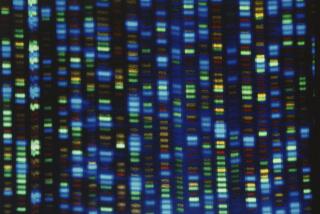Do-it-yourself DNA testing: A risk or a right?
There are plenty of medical tests that consumers can give themselves at home — tests to finds out if they are pregnant, if they have a urinary tract infection, and if their blood sugar levels are too high or too low, to name just a few.
Do-it-yourself genetics tests are joining this list. After mailing a saliva sample to a lab, consumers can receive information about their genetic risk for a variety of diseases, including type 2 diabetes, Parkinson’s disease and several types of cancer. They can also get predictions about how well they would respond to more than a dozen types of drugs. The results can be difficult to interpret, and they may not be reliable. No medical experts need be involved.
That has stirred controversy among doctors, geneticists, bioethicists and consumer advocates. Some believe that in bypassing health professionals, the tests are irresponsible at best and potentially dangerous at worst. Others feel that individuals who want their personal health-risk information should be able to get it, plain and simple. The Food and Drug Administration is weighing both sides as it mulls whether to regulate this fast-growing industry.
Read on for two views on the topic.
Allowing people to get unfiltered, unregulated genetic test results may prompt them to make bad decisions about their healthcare.
Dr. Bruce R. Korf is the chairman of the department of genetics at the University of Alabama at Birmingham and the immediate past president of the American College of Medical Genetics.
The kind of regulation I would like to see on direct-to-consumer genetic tests would require the involvement of medical professionals who understand the testing information, its limitations and its applications, and who can interpret the information in a way that makes sense to each person.
Despite the fact that direct-to-consumer genetic testing companies are, for the most part, marketing their materials as informational — with caveats about not using them for medical decision-making — the potential exists for consumers to use them for medical decision-making. There are concerns about that on a few levels.
First, people could make decisions about their health based on information that they have incorrectly interpreted. Because of their test results, they may want to pursue invasive or expensive interventions, ranging from imaging studies to blood tests, when their risk for disease is actually very modest. Also, the test results may not even be accurate for them if the genetic link to a disease were found in people of European descent but they happen to be of different heritage, such as Asian or African.
Other people might mistakenly think they are protected from disease and modify their behavior in a negative way. For instance, someone who finds out that he is at decreased risk for type 2 diabetes might decide that losing weight and exercising isn’t important for him anymore, so he changes his lifestyle in a way that could still lead to diabetes.
The efficacy of these tests is also questionable — it takes more than having a test result to put the information to proper use, and we don’t necessarily have the appropriate medical systems in place yet. For instance, testing may reveal your potential reaction to medication used in emergency situations, like a blood thinner. But even if you were to hand your results to your doctor, chances are it would be buried in your medical record and wouldn’t be accessed if and when you needed it.
At this point in time, we as a society are also sharing the burden of paying for healthcare. So when someone goes through direct-to-consumer testing and subsequently seeks expensive follow-up testing, it has an impact on the resources of society as a whole. Personal genomic testing is, therefore, not just a matter of personal freedom; its use intersects with the needs of the community.
People who want to see what’s in their DNA — and what it means for their health — should have the right to do so.
Misha Angrist is an assistant professor at the Duke University Institute for Genome Sciences and Policy and author of the book “Here is a Human Being: At the Dawn of Personal Genomics.”
I don’t think there’s anything wrong with giving somebody a peek at the science offered by direct-to-consumer genetic testing, even if it’s tentative and might change tomorrow. We are confronted with uncertain medical information all the time — for instance, the benefits and risks of mammograms, red wine or vitamin D. I think people understand this more than we give them credit for.
You hear talk of people jumping off buildings because they view their genetics information as deterministic, that the tests are dangerous and people can’t handle the truth. But all of the evidence we have suggests that those types of responses are extremely rare.
Researchers have looked at what happens psychologically when people learn their genetic risk for late-onset Alzheimer’s disease, and the answer is very rarely anything bad of lasting consequence. People who test positive get depressed, as you would expect, but ultimately they get over it and they go on with their lives — and very few of them regret knowing their risk.
Additionally, those of us who are currently into direct-to-consumer testing are a self-selected group, mostly early adopters and science geeks. We know that some small amount of the information is powerful, while most of it is quite limited and should be taken with a large grain of salt.
By pursuing direct-to-consumer genetic testing, we stand to gain a different relationship with genetics and with ourselves. We are less likely to be governed by fear, and we are more apt to understand that genes are not destiny. If and when interventions or therapies become available for what are currently untreatable, devastating inherited diseases, by already having our susceptibility information we presumably will be in a better position to act.
I suspect that the public is not as stupid as the paternalists think they are. I think most people understand that they are not buying a crystal ball but, rather, just a snapshot of what we think we know today, the interpretation of which is subject to change.
More to Read
Sign up for The Wild
We’ll help you find the best places to hike, bike and run, as well as the perfect silent spots for meditation and yoga.
You may occasionally receive promotional content from the Los Angeles Times.










